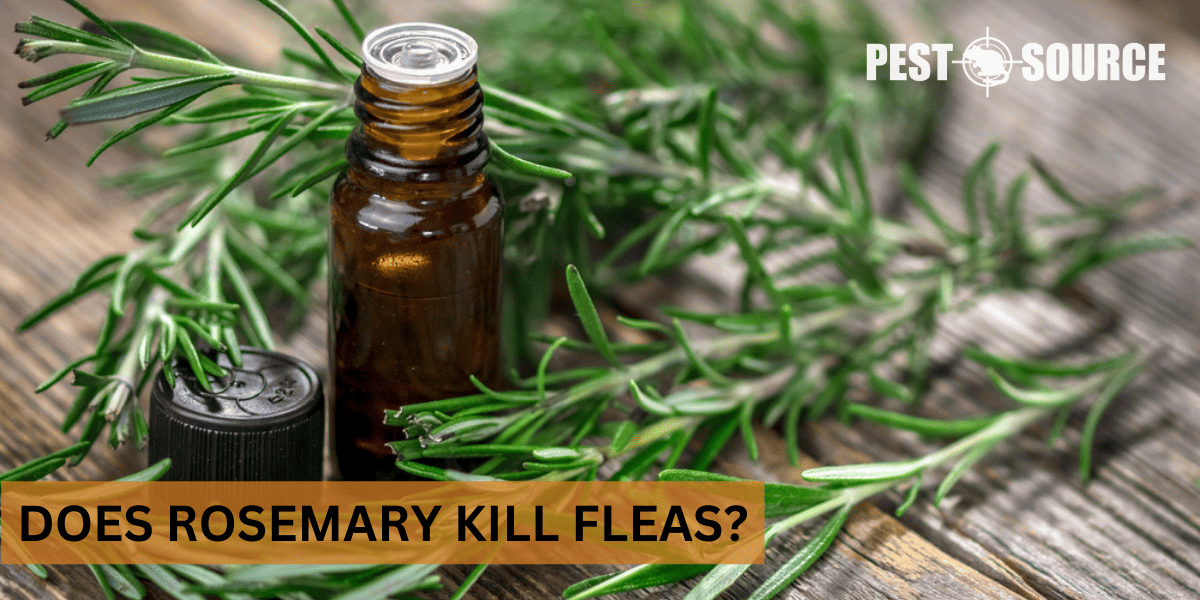Are you searching for a natural solution to combat fleas on your beloved pets and within your home? You may have come across claims about rosemary’s effectiveness in killing and repelling these pesky parasites.
In this article, we delve into the relationship between rosemary and fleas, explore the safety and implications of using rosemary for flea control on dogs and cats, and discuss alternative methods for natural flea control. So, let’s find out whether rosemary is the effective and safe flea control solution you’ve been looking for.
POINTS
- Rosemary’s effectiveness in killing and repelling fleas is largely based on anecdotal evidence, and its actual efficiency may vary.
- In moderate amounts, rosemary is generally safe for dogs, but caution should be exercised when using it on cats, particularly in the form of essential oils.
- Always consult with your veterinarian before using rosemary, rosemary oil, or any other essential oils on your pets to ensure proper use and safety.
- Other essential oils, such as lemongrass, lavender, eucalyptus, and cedarwood oil, can be used as alternative natural flea control methods, but their use should also be discussed with a veterinarian.
- In addition to rosemary and essential oils, diatomaceous earth, flea combs, apple cider vinegar, and regular grooming can serve as natural flea control methods. Consult your veterinarian for advice on the best approach for your pets.
What is the Relationship Between Rosemary and Fleas?
What are the General Claims about Rosemary’s Effects on Fleas?

Rosemary is a popular herb that many people claim to be effective in combating fleas on pets and in the home. Widely used in natural remedies, some claim that rosemary can both kill and repel fleas.
Does Rosemary Kill Fleas?
Although there is anecdotal evidence supporting rosemary’s flea-killing properties, scientific research is less clear. In general, rosemary can be harmful to some insects, but its effectiveness against fleas is not well-established.
Does Rosemary Repel Fleas?
Similar to its flea-killing capabilities, rosemary’s ability to repel fleas is also mainly based on anecdotal evidence. Some pet owners have reported that using rosemary in their homes or on their pets has helped to keep fleas away.
Is Rosemary Used as a Flea Repellent?

Yes, rosemary is sometimes used as a flea repellent for pets and in homes. Pet owners may sprinkle dried rosemary on their pets’ beds, carpets or other infested areas. Rosemary can also be found in some natural flea repellent products.
Can Rosemary be Used to Make a Flea Spray?

Yes, it is possible to make a homemade rosemary flea spray. To do this, you can boil water with rosemary leaves and wait for the mixture to cool. Once cooled, strain the solution, and pour it into a spray bottle for use on your pets and other infested areas.
How is Rosemary Used to Kill Fleas?
Rosemary can be used in various forms to attempt to kill fleas:
- Some pet owners use dried rosemary leaves.
- Others prefer to make a rosemary solution.
- Rosemary spray is another option for application.
- Rosemary oil can be applied on pets or infested areas.
Can Rosemary Oil be Utilized for Flea Control?
Does Rosemary Oil Kill Fleas?

Rosemary oil’s effectiveness in killing fleas is also largely based on anecdotal evidence. Some pet owners claim that rosemary oil can kill fleas, while others may not see any noticeable effect.
Can Rosemary Oil be Used as a Repellent for Fleas?
Anecdotal evidence suggests that rosemary oil may provide some repellent effect against fleas. However, scientific research is lacking, and the actual effectiveness of rosemary oil as a flea repellent varies.
Can Rosemary Oil be Used to Make a Flea Spray for Pets?

Yes, you can use rosemary oil to make a flea spray for pets. Mix a few drops of rosemary oil with water in a spray bottle, and apply it sparingly to pets’ fur to create a homemade remedy. Be cautious with the concentration, as concentrated oils can be harmful to pets.
How is Rosemary Oil Used for Fleas on Dogs and Cats?

Rosemary oil can be used in various ways to help control fleas on dogs and cats. Some people use diluted rosemary oil as a topical spray or add the oil to their pets’ shampoo. Others use rosemary oil in homemade flea repellent remedies. However, be aware that some pets, especially cats, may be sensitive to rosemary oil.
What are the Implications of Using Rosemary for Flea Control on Dogs?

Can Rosemary be Safely Used for Fleas on Dogs?
Rosemary can be used safely for fleas on dogs in moderate amounts. However, it’s essential to consult with your veterinarian before using rosemary or rosemary oil on your pet, as some dogs may have allergic reactions to these substances.
Is Rosemary Oil Safe for Dogs?
Rosemary oil is generally considered safe for dogs when used in small amounts and properly diluted. However, ingesting concentrated rosemary oil can be harmful to dogs. Always consult with your veterinarian before using rosemary oil on your pet, and never apply undiluted oils directly to their skin.
Do Dogs Like Rosemary?
Dogs’ preferences for rosemary can vary. Some dogs may enjoy the scent and taste of this herb, while others may be indifferent or dislike it. Introduce rosemary to your dog in small amounts to see how they react to it.
How Much Rosemary Can be Given to Dogs?
In general, small amounts of rosemary are safe for dogs. However, it’s essential to consult with your veterinarian to determine the appropriate amount of rosemary to give your pet based on their size, age, and general health.
What is the Effect of Rosemary Extract on Dogs?
Rosemary extract can be beneficial for dogs when used in appropriate amounts. It is known to have antioxidant properties and can support their immune system. However, consult with your veterinarian before using rosemary extract on your dog to ensure it is appropriate for their specific needs.
Is Rosemary Poisonous to Dogs?
Rosemary is not considered poisonous to dogs when consumed in small amounts. However, ingesting concentrated rosemary oil can be harmful. Always consult your veterinarian before introducing rosemary or rosemary oil to your pet.
Is Rosemary Beneficial for Dogs?
Rosemary can provide several health benefits for dogs. In addition to its potential flea control properties, rosemary is known to have antioxidant properties and can support healthy digestion. Some pet food companies even include rosemary as a natural preservative in their products.
Can Dogs Eat Rosemary?
Dogs can eat small amounts of rosemary without any adverse effects. However, always consult with your veterinarian before giving your dog any new food or supplement to ensure it is safe and appropriate for their specific needs.
What are the Implications of Using Rosemary for Flea Control on Cats?

Can Rosemary be Used Safely for Fleas on Cats?
Rosemary can be used for flea control on cats with caution. Cats are more sensitive to essential oils, including rosemary oil, than dogs, so it’s crucial to use them sparingly and in appropriate dilutions. Always consult with your veterinarian before using rosemary or rosemary oil on your cat.
What is the Effect of Rosemary Extract on Cats?
The effects of rosemary extract on cats are not well-studied. Cats may have an increased sensitivity to the compounds found in rosemary extract compared to dogs. Thus, it is essential to consult with your veterinarian before using rosemary extract on your cat to ensure it is appropriate and safe for their specific needs.
How Can Other Essential Oils be Used for Flea Control on Pets?
What Other Oils Can be Used for Fleas on Dogs?
Several essential oils are known to have flea-repellent or flea-killing properties. Some popular alternatives to rosemary oil include:
| Essential Oil | Effectiveness Against Fleas | Safe for Dogs | Safe for Cats | Notes |
|---|---|---|---|---|
| Lemongrass | Repels fleas due to citral and geraniol | Yes | No | Dilute properly; avoid use on cats due to potential toxicity. |
| Lavender oil | Has repellent properties; calming effect | Yes | No | Dilute well; toxic to cats, so use cautiously and only on dogs. |
| Eucalyptus oil | Effectively repels fleas | Yes | No | Not to be used on cats; dilute for dogs and avoid direct inhalation. |
| Cedarwood oil | Pesticidal and repellent properties | Yes | Yes | Safe when diluted; always test for sensitivity before regular use. |
Remember to consult your veterinarian before using any essential oil on your pets to ensure safety and proper usage.
Conclusion: Is Rosemary an Effective and Safe Flea Control Solution for Pets?
Does Rosemary Effectively Kill and Repel Fleas?
Rosemary’s ability to kill and repel fleas is mostly based on anecdotal evidence, and its effectiveness can vary. While it’s true that rosemary has some insecticidal properties, scientific research is lacking, and it may not be as effective as synthetic flea treatments.
Is Rosemary Safe and Beneficial for Dogs and Cats?
Rosemary, in moderate amounts, is generally safe and can be beneficial for dogs. However, caution should be exercised when using rosemary on cats. Consult your veterinarian before using rosemary or rosemary oil on your pets, as some animals may have reactions to these substances.
What are Other Potential Methods for Natural Flea Control?
In addition to rosemary and other essential oils, there are several other natural flea control methods:
- Diatomaceous earth: A non-toxic powder made from crushed fossils that can help control fleas by dehydrating them.
- Flea comb: Regularly combing your pets with a flea comb can help remove fleas and flea eggs from their fur.
- Apple cider vinegar: Diluting apple cider vinegar with water can create a flea spray that can help repel fleas but rarely kills them.
- Regular grooming: Keeping your pets clean and well-groomed can reduce the chances of flea infestations.
Before trying any natural flea control method, consult your veterinarian for advice on the best approach for your pets. In some cases, conventional veterinary-prescribed flea treatments may be necessary to keep your pets healthy and flea-free.



